Volume 31 Number 1 Fall 2008
In this Issue
Features
- Holding on to James
- Trading Places
- Dealing with Your DNA
- Classroom Classics
The Editor's Page
- Tricks of the Trade
- Letters to the Editor
Along Middle Path
- The Film's the Thing
- Sound Bites
- What's your Kenyon Quotient?
- Kenyon in the News
- The Hot Sheet
- Gambier is Talking About...
- Around the Globe
- The Doors of Kenyon
Sports
- Ohio State University Football Turns to Kenyon's Swimming Program for Inspiration
- Before the Glory
- Sports Round-Up
Books
- Odd Man In
- Reviews
Office Hours
- Musings: Creative Solutions
- Quadrennial Concert
- Holdener Wins Top Math Award
- Burning Question: Is Seasonal Affective Disorder For Real?
- Digging Deeper with Enthusiasm and Brilliance
Alumni News
- Cycling Cross-Country at 73
- Sound Boards and Duct Tape
- Obituaries
- Alumni Digest
The Last Page
- Notes for my Lifesitter
Reviews
Of Interest
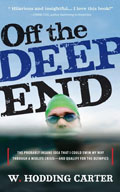 Off the Deep End: The Probably Insane Idea that I Could Swim My Way through a Midlife Crisis—and Qualify for the Olympics
Off the Deep End: The Probably Insane Idea that I Could Swim My Way through a Midlife Crisis—and Qualify for the Olympics
by W. Hodding Carter '84
Algonquin Books
In the midst of a rough patch in his marriage and career, forty-one-year-old W. Hodding Carter rediscovers a love of competitive swimming. Known for his obsessive projects (he built a replica of a Viking boat in A Viking Voyage and traced the route taken by Lewis and Clark in Westward Whoa), Carter jumps into his latest interest feet first. He decides he's going to qualify for the Olympic trials, aging muscles and inhospitable schedule be damned.
The result is a tale of self-discovery, nostalgia, and hilarity. "I've always associated swimming with freedom. And joy. And youth," Carter writes. "Set me at the edge of a body of water and I know—no matter how turbid, rough, or expansive that realm might be, I can escape—like Horatius, the savior of Rome, swimming to shore after defending the bridge against the Etruscans." In the four years the book chronicles, Carter (mostly) follows a rigorous training routine. He competes at master's events, swims through the British Virgin Islands on assignment for Outside magazine, enrolls in a camp run by former three-time Olympic gold medal winner Gary Hall Jr., and even returns to Kenyon to train with his former coach, Jim Steen (which he wrote about in the Spring/Summer 2007 Bulletin).
Splashes of self-deprecating wit, clever use of footnotes, and Carter's ability to look himself honestly in the middle-aged eye make Off the Deep End a can't-put-down read. In the end, our hero succeeds in getting himself into fighting shape, while making peace with his family and even discovering a new part-time career as a swim coach.
No, you didn't see him on the starting blocks in Beijing. Carter's times weren't good enough, alas, to take him to the trials. What really matters, though, is the journey, and Carter's willingness to take the plunge.
—T.V.
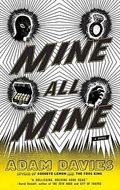 Mine All Mine
Mine All Mine
By Adam Davies '94
Riverhead Books
Blessed with superior senses and a resistance to poisons, Otto Starks makes his living guarding valuable pieces of art. It's a lucrative if ascetic existence, until a woman named Charlie Izzo steals Starks' heart. Starks can't tell Charlie what he does for a living, so he pretends to be a talent scout for the New York Mets, but as he and Charlie become more entangled, his dissembling entraps him in a web of doubt. To make matters worse, after Starks' nemesis, the Rat Burgler, manages to pull a series of heists under his very nose, an investigator suspects that our hero is in on the crimes.
Popping with Raymond Chandleresque phrasing and fast-paced scenes, Mine All Mine pulls the reader into a plot with enough twists to disorient Chubby Checker. Davies, whose 2002 debut novel The Frog King hopped onto bestseller lists and is being made into a movie starring Joseph Gordon-Levitt (3rd Rock from the Sun, Brick, Mysterious Skin), turns clichés on their heads, with passages like, "He punches me in the mouth and I bleed assiduously upon the concrete. The red Rorschach on the floor looks like a pattern of augury telling me who is going to die, and in what manner. But I don't need clairvoyance to tell me that. Common sense can handle that on its own."
Where The Frog King realistically depicted the life of a New York publishing assistant, Mine All Mine flirts with sci-fi, and Davies has fun with the outlandish possibilities. As the plot ratchets up into the stratosphere, what keeps us grounded is Davies' wry writing and a breathless need to know where Starks is going to end up.
—T.V.
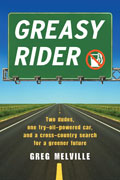 Greasy Rider: Two Dudes, One Fry-Oil-Powered Car, and a Cross-Country Search for a Greener Future
Greasy Rider: Two Dudes, One Fry-Oil-Powered Car, and a Cross-Country Search for a Greener Future
by Greg Melville '92
Algonquin Books
Greg Melville needed a new car, but he ended up getting a new paradigm. When Melville, a freelance journalist and father of two, agrees to his wife's suggestion that they buy an old diesel Mercedes wagon and convert it to run on vegetable oil, he starts to question society's overall energy infrastructure. Whereas once he'd assumed that "converting a vehicle to run on veggie oil was something that only hippies do, when they're not making their clothes out of hemp," he begins to realize that "nearly anyone can operate and maintain a french-fry car."
To prove his point, Melville decides to mount a cross-country trip, from Vermont to California, with Iggy, his best friend from his Kenyon days. The catch is, they'll fuel the entire trip with fryer oil foraged from restaurant Dumpsters along the way. Iggy is both more mechanically inclined and more conservative than Melville, which makes for some humorous odd-couple moments, but he also challenges Melville to find out more about alternative energies such as wind power, geothermal, and ethanol. These "side-trips" become chapters sprinkled into the main narrative, painlessly educating the reader about environmental issues.
Melville's light-hearted writing style places the reader in the passenger seat, and Greasy Rider is that rare thing: an entertaining trip that proves a serious point. As Melville writes, "Change toward a sustainable, secure future will only come through a nationwide effort—and the resources are already at our disposal."
—T.V.
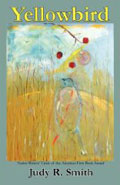 Yellowbird
Yellowbird
by Judy R. Smith
Lewis-Clark Press
Alternating entries by Sophia Peabody Hawthorne, Lizzie Shaw Melville, and the eponymous Yellowbird, Judy R. Smith weaves a powerful fictional narrative that evokes the sometimes confined existence of women in mid-nineteenth-century America. Married to tempestuous literary figures, Sophia and Lizzie eke out intellectual lives between health troubles, children, domestic abuse, and social limitations. Yellowbird watches over them from an omniscient distance, weaving a blanket of quills.
Smith, a longtime English professor at Kenyon, takes advantage of her scholarly knowledge of Hawthorne, Melville, and Native American literature in Yellowbird, filling the short chapters with evocative historic details. Sophia, a painter, observes the world sensually, describing the era's fashions and a visit to the Louvre. Caught in an unhappy marriage, Lizzie draws strength from her Native American heritage, teaching herself the arts of her ancestors. And in the end, Yellowbird sews their stories into the quilt of eternity.
Awarded the First Book Award from the Native Writers Circle of the Americas for 2006, Yellowbird is a haunting, poetic book—a channeling, almost, of figures neglected in history.
—T.V.
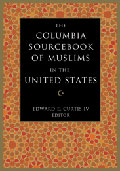 The Columbia Sourcebook of Muslims in the United States
The Columbia Sourcebook of Muslims in the United States
edited by Edward E. Curtis IV '93
Columbia University Press
Post 9/11, Islam in America has occupied a strange space. Absent from pop culture except as a stereotype, subject to fear and prejudice, Muslims find themselves having to explain their religion to an audience that may be confused, compassionate, or combative.
In The Columbia Sourcebook of Muslims in the United States, Edward E. Curtis IV helps "find Islam" in the American experience, collecting primary sources that contextualize its place in our country's history and in contemporary culture. The book covers a lot of ground. Readers can find the personal account of an early Muslim missionary, Mohammed Alexander Russel Webb, who converted from Presbyterianism in the mid-1800s and set out to defend his religion as one that "appeals directly to human rationality and intelligence." And they can jump ahead to the American Islamic Congress' 2006 "New Guide to Muslim Interfaith Dialogue," which embraces religious pluralism and suggests activities for dialogue.
The Sourcebook proves a comprehensive antidote to fearful misapprehensions of a multidimensional religion. Curtis, whose previous works include Black Muslim Religion in the Nation of Islam , 1960-1975, and Islam in Black America, has created a collection that should interest anyone who wants to go deeper, and broader, than the latest headlines.
—T.V .
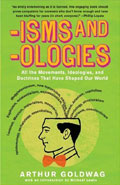 -Isms and -Ologies: all the movements, ideologies, and doctrines that have shaped our world
-Isms and -Ologies: all the movements, ideologies, and doctrines that have shaped our world
by Arthur Goldwag '79
Quercus
Antinomianism. Minimalism. Supply-side economics. Sure, you've pretended to know what these terms mean, perhaps nodding along during cocktail party conversation. The truth is, such specialized knowledge may have evaporated, or at least blurred, soon after you closed the door on your last college class.
Arthur Goldwag is here to help. In Isms and Ologies, he compiles the movements and philosophies that have swayed history—and some that merely brushed against it—and describes them in succinct, fun-to-read capsules. Meet the Locofocoists, a group of folks who split from the New York Democratic party in the early 1800s to oppose banks and paper money, named after a popular self-lighting cigar. Then there's Don Juanism, after the legendary Seducer of Seville. And if you've always struggled to untangle string theory, that's covered here, too.
Goldwag, author of the Beliefnet Guide to Kabbalah (2005), proves an agile guide, choosing enlightening quotes from primary sources and uncovering a few choice anecdotes. In his introduction, he warns us to "treat my definitions with due caution—many of the topics I cover are worthy of an entire library in their own right." This turns out to be part of the pleasure of Isms and Ologies, however, as it becomes an introduction to things you might never otherwise stumble on and stimulates you to learn more. In what other book, after all, might you find Muggletonianism mixing with Floccinaucinihilipilification?
—T.V .
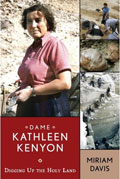 Dame Kathleen Kenyon: Digging Up the Holy Land
Dame Kathleen Kenyon: Digging Up the Holy Land
by Miriam C. Davis
Left Coast Press
In this, the first full-length biography of the great archaeologist Kathleen Kenyon, historian Miriam Davis tells the compelling story of one of the true originals of the twentieth century.
Born in 1906, Kathleen Kenyon was one of two daughters of Sir Frederic Kenyon, whose great-uncle was the second Lord Kenyon, Baron of Gredington, for whom Kenyon College is named. Kathleen enjoyed a childhood divided between London—where her father served as director of the British Museum and, with his wife and daughters, occupied an attached apartment—and the family's country home in Surrey. In both places, Kathleen indulged both the curiosity about history and the natural world and the independence that would mark her long career.
After dabbling in archaeology as a modern-history student at Oxford's Somerville College, Kathleen came under the tutelage of several female archaeologists on digs in Africa and in England arranged by her father. While her choice of archaeology as a profession seems almost accidental, she took it up with a fervor that brought her distinction as a practitioner and as a role model for others in the field. Among her many achievements were the development of trenching methods that became standard at digs, the discovery of the world's oldest city at Jericho, and the identification of the original City of David in Jerusalem.
On April 17, 1959, Kenyon College awarded Kathleen an honorary doctorate in humane letters, with a citation joking that "in your trench ... you have proved what we on this hill have long suspected, that if men dig down to the very beginnings of our culture they will find Kenyon at the bottom." Two years later, she became principal of Oxford's St. Hugh's College, serving until 1973—the year in which she was made a Dame Commander of the Order of the British Empire—and playing a central role in the university's expansion of opportunities for female students.
Davis' impressive biography illuminates not only the life of Kathleen Kenyon, a woman often ahead of her time, but also the inner workings of the world of archaeology, especially in the Middle East of the mid-twentieth century.
—Tom Stamp, college historian
Gambier, Ohio 43022
(740) 427-5158

 Delicious
Delicious Facebook
Facebook StumbleUpon
StumbleUpon Digg
Digg reddit
reddit